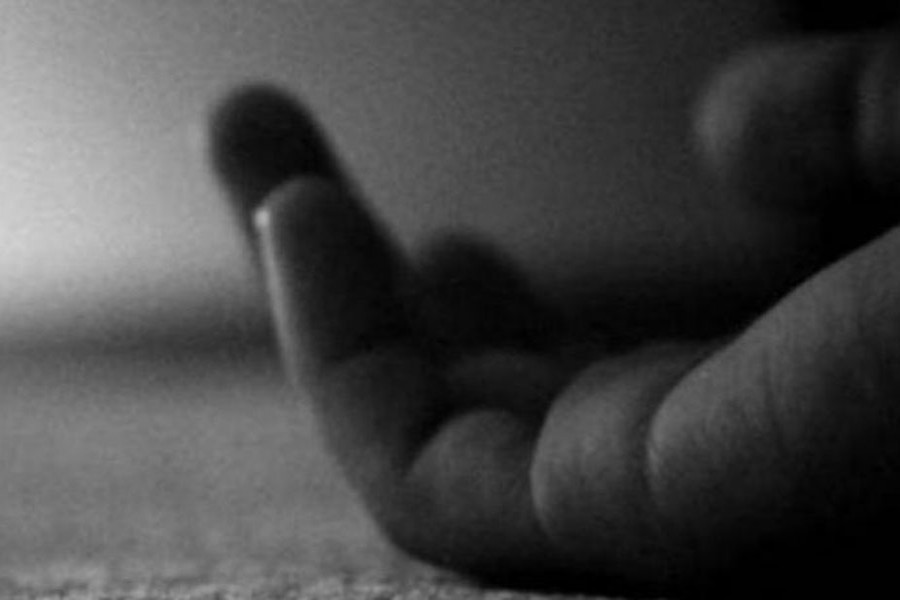
Published :
Updated :

Over the past six to seven years, incidence of suicide has been steadily rising in the country. According to data from the Bangladesh Police, at least 11,200 people killed themselves in the country last year. The numbers were 11,095 in 2017; 10,600 in 2016; 10,500 in 2015 and 10,200 in 2014.
This shows that on an average there are 30 suicides every day.
Across the world, nearly 800,000 people commit suicide every year, according to World Health Organisation data.
Still, suicide is a preventable global public health problem that is often neglected by policymakers. Psychiatric morbidities are important risk factors for suicide. Repeated evidences suggest that about 90 per cent of suicide victims had at least one mental disorder. Usually, 60 per cent of suicide deaths are caused by depression. Other psychiatric disorders often found in psychological autopsies of suicidal deaths are personality disorders, adjustment disorders, alcohol and drug-related disorders, bipolar disorders, schizophrenia and other psychotic disorder, anxiety disorders, impulse control disorders, somatoform disorders, sleep disorders, eating disorders, and childhood psychiatric disorders.
Previous studies have revealed that up to 83 per cent of suicides have had contacts with primary care physicians within a year prior to the death. Around two-thirds of them have occurred within a month. This is why psychologists and psychiatrists believe that treatment of mood disorders is a key to preventing suicide.
Improved and regular screening of depressed patients with better treatment subsequently should be ensured at the primary-care level. After ensuring acute management, long time follow-up is also necessary as depression is a chronic and recurrent disorder.
TREATMENT OF MENTAL DISORDERS CAN PREVENT SUICIDE: Treatment of disorders with psychotropic medicines is a remarkable part of suicidal prevention. Acute treatment can prevent suicide significantly as has been found by the previous researches, provided the long-term treatment include prophylactic by antidepressants, mood stabilisers and antipsychotics. These substantially reduce suicidal thoughts and thus suicide attempts. Use of anti-depressants is a very strong strategy in suicide prevention. Selective Serotonin Reuptake Inhibitors (SSRIs) are modern, less toxic anti-depressants that are effective at reducing suicides through both short-term and long-term treatment.
PSYCHOLOGICAL INTERVENTIONS: Psychotherapy plays a significant role in suicide prevention by reducing the acute emergency symptoms and long-term complications after proper correction of the cognitive distortions. For suicide prevention, processes like cognitive behaviour therapy (CBT), dialectical behavioural therapy (DBT), problem-solving therapy, a brief family-based crisis intervention and intensive care with outreach, interpersonal psychotherapy were found to be effective. Studies have revealed that CBT reduces the suicidal attempt by a half when compared with patients receiving traditional care.
POST DISCHARGE, FOLLOW-UP INTERVENTIONS: Persons with mental disorders and suicidal risks or dealing with severe psychological crises need urgent psychiatric admission for crisis management and psychotropic medicines. Previous evidences have revealed that suicidal tendencies are likely to manifest within a few days after discharge from a hospital. So, close, long-term observation, along with regular follow-ups, is necessary.
Suicidal attempts and tendencies to commit suicide were drastically reduced among patients who received regular phone calls, emails and other forms of communication from caregivers, family members and friends. Increased attention from family members and engagement in social programmes also play a significant role in keeping suicidal tendencies at bay among patients.
Dr. S M Yasir Arafat is an Assistant Professor, Department of Psychiatry, CARe Medical College, Dhaka, Bangladesh
arafatdmc62@gmail.com


 For all latest news, follow The Financial Express Google News channel.
For all latest news, follow The Financial Express Google News channel.